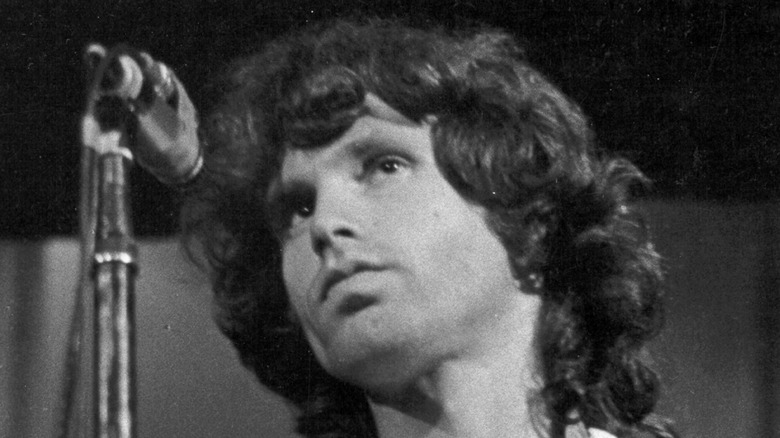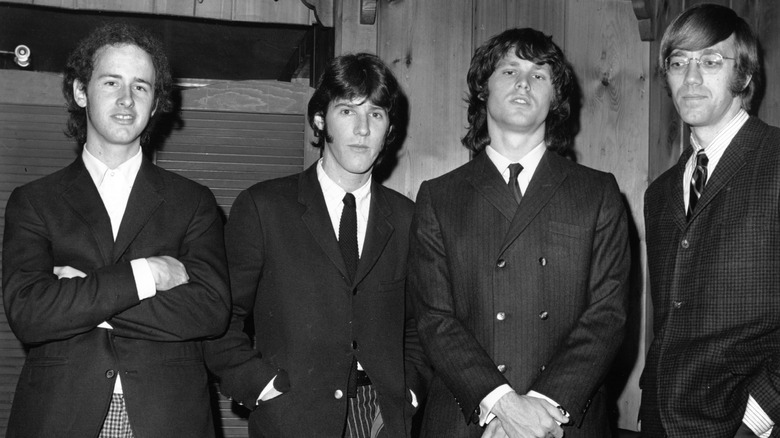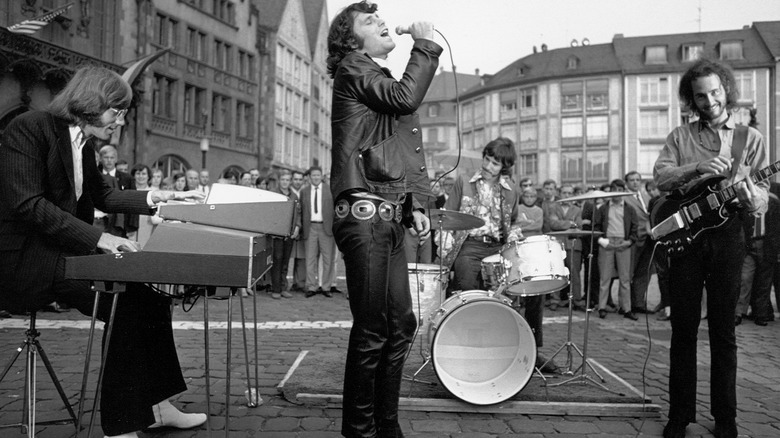Why Ed Sullivan Banned The Doors After One Performance
During the Summer of Love in 1967, the Doors were one of several bands that helped bring psychedelic rock to the mainstream. Despite their decided lack of a bassist, they were a band with no real weak link — Jim Morrison's moody baritone vocals (and oftentimes out-of-nowhere screaming) blended well with Ray Manzarek's intricate keyboard excursions, Robby Krieger's understated, yet virtuous guitar work, and John Densmore's inventive jazz-influenced drumming. Then there were the live shows. Watching a Doors gig or concert was an adventure, as you never knew what outlandish things Morrison, aka the Lizard King, was going to say ... or do.
That summer, the Doors were gaining momentum as one of America's fastest-rising bands, and in September of 1967, they were booked to appear on "The Ed Sullivan Show," where they were to perform their latest single at the time, "People Are Strange," as well as the chart-topping song "Light My Fire" from their self-titled debut album (via Ultimate Classic Rock). That appearance did help the Doors, well, break on through to a wider audience, but unlike Elvis Presley, the Beatles, and many other legends who got their big break on Sullivan's show, the Los Angeles-based act never got to return to the program. Here's why the Doors received a lifetime ban from "The Ed Sullivan Show" after just one performance.
The Doors refused to censor the alleged drug reference on Light My Fire
At 65 years old at the time of the Doors' appearance, Ed Sullivan was old enough to be the grandfather of many of the edgy rockers he invited to perform on his "really big schew." That meant he wasn't exactly hip to the idea of young whippersnappers dropping sex and drug references in their songs. Earlier in 1967, he asked the Rolling Stones to change the title lyric of their song "Let's Spend the Night Together" to the much more chaste "let's spend some time together." And he wasn't joking around, either — according to Billboard, he gave the British band the strictly-worded ultimatum "either the song goes, or you go" when it came to the lyrical change.
As for the Doors, Sullivan's beef was with the line immediately preceding the first chorus of "Light My Fire," which went, "girl, we couldn't get much higher." Seeing that as a reference to drug use, he asked the group to change the line to "girl, we couldn't get much better." That, if you come to think of it, makes nary a whit of sense, and we're guessing the band felt the same way because they went ahead and performed "Light My Fire" as-is. (In the 1991 biopic "The Doors," Val Kilmer, who played Jim Morrison, can be seen trolling Sullivan with his body language while singing the word "higher" — that didn't actually happen, but it did make for an entertaining scene!)
Sullivan's team wanted to book the Doors six more times before the ban
Angered by the Doors' refusal to play ball, Ed Sullivan slapped the Doors with a lifetime ban from his show, but if you consider that the final episode of "The Ed Sullivan Show" aired on June 6, 1971, and that Jim Morrison died one month later, we never really got to see if time would've healed the wounds caused by one supposedly unwholesome lyric. What we do know, however, is that Sullivan's producers were apparently fans of the Doors prior to their controversial performance. According to Ultimate Classic Rock, the plan was to book the group for six more appearances on "The Ed Sullivan Show," but after Morrison insisted on singing "girl, we couldn't get much higher," the decision was made to ban the Doors for life.
Despite no longer being able to play on "The Ed Sullivan Show," the Doors' career prospects were unaffected — in fact, one can say that the ban made them even more popular with their largely young, rebellious fanbase. They did perform on other popular television shows, and subsequent releases "Strange Days," "Waiting for the Sun," "The Soft Parade," "Morrison Hotel," and "L.A. Woman" all hit the top 10 of BIllboard's album charts. Arguably, it was Morrison's escalating drug and alcohol use that did the Doors in, as opposed to the outrageous stuff they did during their public appearances. (And yes, that includes their infamous Miami concert, too.)


